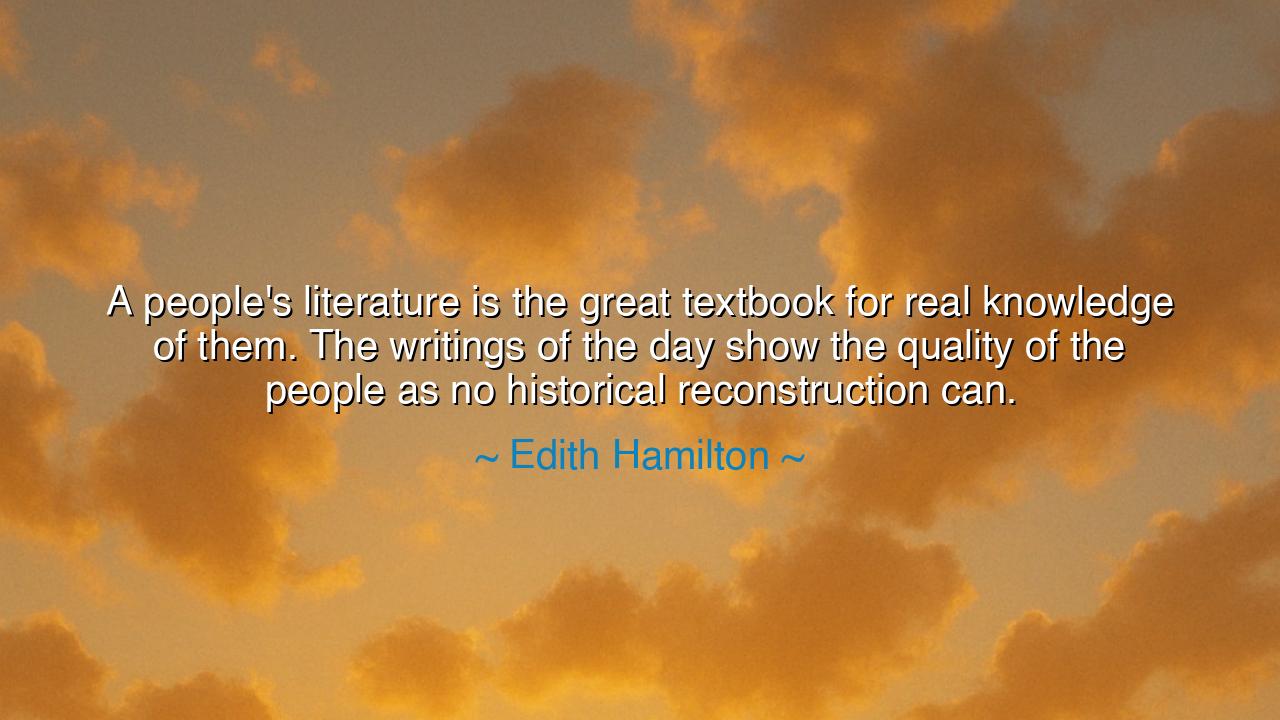
A people's literature is the great textbook for real knowledge of
A people's literature is the great textbook for real knowledge of them. The writings of the day show the quality of the people as no historical reconstruction can.






“A people's literature is the great textbook for real knowledge of them. The writings of the day show the quality of the people as no historical reconstruction can.” Thus spoke h Hamilton, the great interpreter of the ancient world, who breathed new life into the wisdom of Greece and Rome. In these words, she reveals a truth that transcends ages — that the soul of a civilization is not recorded in its monuments or wars, but in its words, in its literature, in the stories and songs that spring from the hearts of its people. History may tell us what a nation did, but literature tells us what a nation was.
For literature is the mirror of the human spirit. It is the echo of a people’s laughter, the record of their sorrow, the dream of their heroes, and the confession of their sins. A nation’s writings — its poems, its plays, its letters — form a living tapestry that no historian, however skilled, can fully weave anew. When we read the Iliad, we hear not only of Achilles and Hector but of the Greek soul itself — proud, passionate, and bound to the fate of glory and grief. When we open Shakespeare, we do not merely encounter Elizabethan England, but the very depths of human nature, laid bare in timeless verse.
Hamilton, who devoted her life to translating the wisdom of antiquity into words modern hearts could feel, understood this deeply. She knew that if you wish to know a people, you must listen to their voices, not just count their battles or list their kings. The stones of ancient Athens may crumble, but the words of Sophocles still burn with moral fire. The empire of Rome has long fallen, yet Virgil’s Aeneid still carries the spirit of endurance and duty. Empires die — but literature endures, carrying forward the heartbeat of a people long after the last soldier has laid down his sword.
Consider, for a moment, the tragedy of the French Revolution. Historians tell us of guillotines and banners, of blood in the streets and the fall of kings. But to feel the soul of that age — to sense the hunger for justice and the despair of betrayal — one must turn to Victor Hugo’s “Les Misérables.” In its pages live the cries of the oppressed, the hypocrisy of the powerful, and the undying hope of the human spirit. There, we see not only what France endured, but what it felt. Such is the power of literature — it gives voice to the voiceless and paints the unseen colors of history.
And look, too, to the American story. One may read records of the Revolution or the Civil War, but the truest lessons are found in the works of Walt Whitman, who sang of the boundless strength and contradiction of the American soul; or Harriet Beecher Stowe, whose pen struck the conscience of a divided nation. Their writings were not mere art — they were revelations, showing the inner heart of a people wrestling with freedom, faith, and fear. Through their words, we touch something that no historian’s chart or chronicle could ever reveal: the living spirit of humanity itself.
Thus, literature becomes a bridge between generations. It binds the past to the present, whispering truths across centuries. When we read, we do not merely learn about others — we become them for a moment. We walk in their sandals, see through their eyes, weep their tears, and dream their dreams. The quality of a people is measured not by the weapons they forged, but by the words they left behind — for from those words, future generations may judge the light or the darkness that once reigned within them.
And so, dear listener, take this teaching to heart: if you wish to know a nation, study its literature — its poets and playwrights, its storytellers and thinkers. Do not let the written word grow dim in an age of noise and haste. Read not only to know, but to understand; not only to inform, but to feel. Read what your ancestors wrote, and you will find that their joys and sorrows still live within you.
The lesson is eternal: to truly know humanity, one must listen to its stories. Gather them, cherish them, share them. For someday, it will be your words — your songs, your thoughts, your truth — that others will read to know what kind of people you were. Let your words, then, be worthy of remembrance. Let them carry the quality of your spirit. In this way, you will join the great chorus of history — and your voice, too, shall endure.






AAdministratorAdministrator
Welcome, honored guests. Please leave a comment, we will respond soon